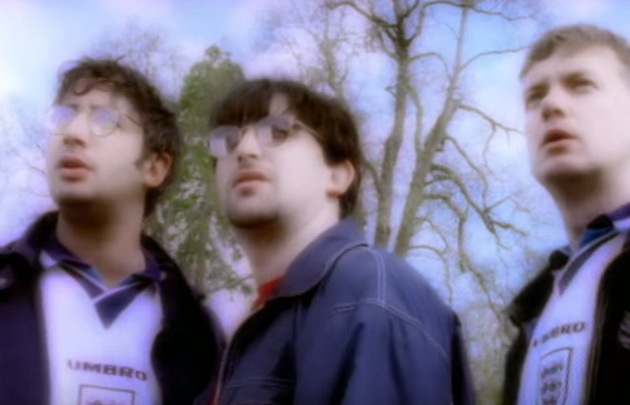This article originally appeared on Noisey UK.I can’t remember the first time I heard “Three Lions”. Like most of the music that makes an impact from a young age, it’s always been there, as though it was passed on to me through the umbilical cord along with all the other important stuff, like blood and oxygen.History states that the track first appeared in 1996, as the official song for the England team in that year’s European championships. I was four years old at the time, so while the season of Britpop and disappointment is likely to have served as my introduction to “Three Lions”, it’s not until the World Cup of ‘98 that the memory becomes a little clearer. As a six year old with grazed knees and a pair of shorts that never seemed to leave my legs all summer, the track followed me everywhere. From the spoils of the school playground, to the suburban bbqs hosted by my dad’s friends, to staying up past bedtime to watch England lose to Argentina in the quarter finals, there was one lone mantra in my head: “it’s coming home, it’s coming home, it’s coming…. Football’s coming home”.Like a record that’s seemingly been left on repeat in a deep crevice of my brain, that mantra has been looping around inside of me ever since. It was there four years later as I sat on a wooden assembly bench in my school hall, watching a pony-tailed David Seaman attempt to save England from the golden boot of Ronaldhino, a vision cast unto me through a cherubic television the headteacher brought in on wheels. It was there again in 2004, when the seemingly-impossible-to-erode arrogance and brilliance of Cristiano Ronaldo knocked England out of the quarter-finals. It was there: again, and again, and again, entering me with force each time an international tournament enveloped the country.You may think understanding football is one of the key components to understanding “Three Lions”, but it’s not (as Frank Skinner confesses in this documentary, upon hearing the song, David Seaman reportedly asked “who is Jules Rimet?”). The European Championships and the World Cup make it feel necessary to convene around a screen, paper plates of chicken drumsticks on our laps and someone’s dog brushing past our legs, waiting for disappointment to seep into our bones like tangible matter - and it’s here that we hear the song the most. That’s part of the reason why the song has followed me around so much. But it’s also there when the football isn’t on too.I don’t follow football: the most I know about this year’s European championship is that we have a player whose name rhymes with party and the whole shebang kicks off in France. So through the last twenty-four years of football tournaments and bbqs and karaoke evenings, the “Three Lions” song hasn’t really burrowed itself into my consciousness through my biennial interest in football, but through its ability to capture the throes and the peaks of what it means to be alive.The track is written by a member of the Lightning Seeds, who were famed for writing bittersweet love songs like “Pure” and “Perfect”, so while “Three Lions” is explicitly based around football, it’s also a forlorn love song that’s imbued with nostalgia, the push and pull between reckless self-belief and despair, the sense of feeling worse off, but also the thirst to get up even if you’re going to get knocked down again. When all those qualities are boiled down, it becomes a song about a very British sense of hope, where we’re all on a small island where nothing ever gets better, but we tell ourselves time and time again that it will. It’s born from a world not entirely of football, but one where we may end up fucked through bad politics or bad weather, but we’ll keep on keeping on, with pint glasses full to the brim even when there’s little more than shrapnel in our pockets.The song has transcended generations, moving from an age of Damien Hirst, Teddy Sheringham and Oasis and through the millennium and the simultaneous rise and fall of New Labour and Michael Owen to continue weaving itself into the minds of Britain’s new casuals. So, in the same way that it can transition across eras, it can also move beyond subject matter. As a child, the “Three Lions” was one of the only cassette tapes I owned and through repeated listenings, it’s taken on a more widespread meaning. “Football’s coming home” isn’t just about the hope that we’ll win a tournament, it’s everything that underpins our desire to succeed. It’s my dad or his friend Kev or his friend Stu or his friend Chris attempting to cook some burgers in the rain. It’s longing dearly for breezy summer evenings, where t-shirts are worn and sundown is perpetually delayed. It is about lager tops and missed penalties as much as it is about wanting something more than the dish that life has served us.I know I’m not alone in my thoughts about “Three Lions”, because even my friends who follow football - the ones who bicker about Rooney being placed in the “pivot position” or the perceived excellence of Jose Mourinho - weren’t alive to remember the situations mentioned in the song’s lyrics. They can’t see that “tackle by Moore”, or when “Lineker scored”, or “Bobby belting the ball”, because those moments took place before their parents fumbled their way through their first date. What they can see is the feeling behind those lyrics though. They may relate a phrase like “All those "oh so near's" / Wear you down, through the years” to their football club, but there’s a duality in that experience that is also buried in their own memories of not succeeding - whether in their job or love life or otherwise - but coming out the other side to try time and time again, the rose-tinted pursuit of a nostalgic dream they’ve seen in the collective experiences of yore pulling them through. The often foolhardy pursuit of glory is the beauty of football - it’s what brings people together - but more importantly it’s the artistic quality that runs through the bedrock of what the “Three Lions” is about. The song has been in our consciousness for the last twenty years now. In that time, no other song dedicated to football has connected quite like it. Not Ant and Dec’s “We’re On The Ball”, not Dizzee Rascal and James Corden’s “Shout For England”, not Embrace’s “World At Your Feet”. That’s because the Embrace track is one of the worst things to ever be recorded, some mutilated bastard that sits somewhere between a riff The Edge forgot to lay down on a U2 record and the b-sides of Keane, and the other two are so basic they sound like they were written by five year olds. The only track that comes close to matching “Three Lions” is “Vindaloo” by Fat Les, and that’s primarily because it appeals to everyone’s inner thirst to bellow nonsense at a deafening volume when drunk.“Three Lions” is still here, because “Three Lions” is all of us, whether we care about football or not. It is the faded memory of a better time we can’t quite remember, and the belief we can achieve the brilliance we continually strive for once again. It is smoking a damp roll-up in the rain as water drips into your pint-glass, because you want to believe that as the night goes on, you’ll be walking home from the one club in your shit town, arm round your mate, already reminiscing about one of the best nights of the year. It is going to the beach because it’s summer, even though there’s a forecast for high winds and dense cloud. It is starting the car to embark on a road-trip, even though the exhaust is broken and one of the windows can’t wind up properly and no one has any money for fuel. As Baddiel explains in the BBC Documentary, “Three Lions” isn’t about winning, and it isn’t about losing. It’s hope over experience. Through that process, no other song has so unintentionally captured the nuanced inner-workings of the collective British psyche.
The song has been in our consciousness for the last twenty years now. In that time, no other song dedicated to football has connected quite like it. Not Ant and Dec’s “We’re On The Ball”, not Dizzee Rascal and James Corden’s “Shout For England”, not Embrace’s “World At Your Feet”. That’s because the Embrace track is one of the worst things to ever be recorded, some mutilated bastard that sits somewhere between a riff The Edge forgot to lay down on a U2 record and the b-sides of Keane, and the other two are so basic they sound like they were written by five year olds. The only track that comes close to matching “Three Lions” is “Vindaloo” by Fat Les, and that’s primarily because it appeals to everyone’s inner thirst to bellow nonsense at a deafening volume when drunk.“Three Lions” is still here, because “Three Lions” is all of us, whether we care about football or not. It is the faded memory of a better time we can’t quite remember, and the belief we can achieve the brilliance we continually strive for once again. It is smoking a damp roll-up in the rain as water drips into your pint-glass, because you want to believe that as the night goes on, you’ll be walking home from the one club in your shit town, arm round your mate, already reminiscing about one of the best nights of the year. It is going to the beach because it’s summer, even though there’s a forecast for high winds and dense cloud. It is starting the car to embark on a road-trip, even though the exhaust is broken and one of the windows can’t wind up properly and no one has any money for fuel. As Baddiel explains in the BBC Documentary, “Three Lions” isn’t about winning, and it isn’t about losing. It’s hope over experience. Through that process, no other song has so unintentionally captured the nuanced inner-workings of the collective British psyche.
Advertisement
Advertisement

